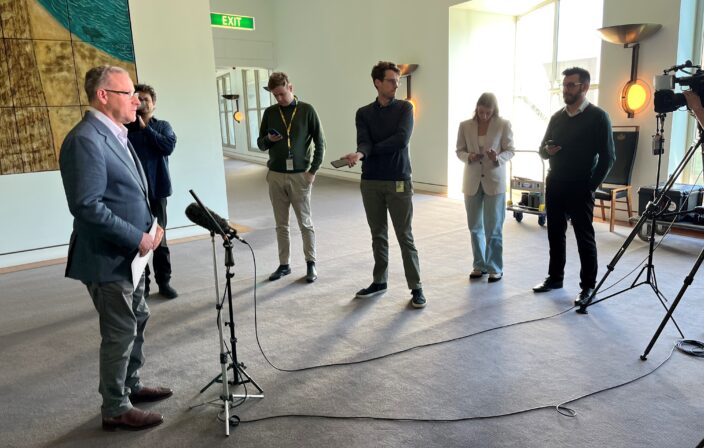Andrew McKellar interview with Andy Park, Radio National Drive
1 Nov 2022
|Transcripts
Event: Andrew McKellar interview with Andy Park, Radio National Drive.
Speakers: Andrew McKellar, chief executive Australian Chamber of Commerce and Industry; Andy Park, host Radio National Drive.
Date: 1 November 2022.
Topics: Workplace relations; multi-employer bargaining; company profits.
E&OE
Andy Park, host Radio National Drive: Business groups are forecasting high costs and ultimately jobs being cut. Andrew McKellar is the CEO of the Australian Chamber of Commerce and Industry. Welcome to you, Andrew. Given today, we’ve seen another rate rise, perhaps predictably, shall we say. Is the minister dreaming that his government can help fuel a lift in nominal wages by Christmas?
Andrew McKellar, chief executive Australian Chamber of Commerce and Industry: Good afternoon, Andy. Great to be with you. Look, I think here, obviously it is very concerning to see another rate rise. It’s not unexpected. It indicates that there is pressure, not just on the cost of living, but I think also on the cost of doing business. In this environment, we have to be responsible. I think business is very supportive of changes, of reforms, that will promote greater equity in our workplaces, so we have no problems with a bunch of changes that the government are proposing around gender pay equity, supporting lower paid workers. That’s not the issue. The issue here is, there are also changes in what the government is proposing that really will impose significant additional burdens on business, and that will put at risk many jobs. Now, if you want to promote higher living standards, if you want to promote greater equity in the workplace, one of the ways to do that is to keep the unemployment rate below 4 per cent.
Andy: Isn’t the real issue here, and as Tony Burke says, Australians have been waiting 10 years for their wages to increase. You must agree that there is urgency for wages growth, if only so Australians can afford to keep the roof over their head, especially at Christmas.
Andrew: Well, there is urgency around this. And unfortunately, a number of the reforms that the government, or the changes that the government are proposing here, won’t deliver that. Instead, they will deliver one size fits all for small businesses and medium size businesses. And I think business has a real problem with those sorts of changes, because they won’t deliver sustainable wage increases. As I said before, we have no problem with what the government is proposing in the low paid sector, and in terms of gender pay equity, those sorts of measures, I think with very modest amendments can go through quite speedily. So we’re not seeking to hold this up. But we do have concerns around those other elements, which need to be fully examined by the Senate. There needs to be an open and transparent inquiry process. We don’t want to see unintended consequences that will lead to higher costs, loss of control in businesses, potentially higher unionisation, jobs being at risk, industrial action. All of these things need to be understood.
Andy: The RBA now expects inflation to peak even higher than previously forecast, thus rendering the budgets forecast on inflation redundant already. Your members would like to see the section on multi-employer bargaining removed from this omnibus bill. Have you had a chance to put that to the treasurer?
Andrew: Well, we’re talking to the government, we’re talking to the minister. Obviously we’re engaging with the treasurer and other senior ministers on a regular basis. So look, we are talking to government. And we hope to get a reasonable hearing there. Equally, we have to remember that there is a parliamentary process here. The government has introduced legislation. The Senate will be looking at that legislation. They have to convince a majority of the senators to support it. Now, we think there are problems with some of the things they’re proposing. We think that they won’t deliver the real economic benefits, they won’t deliver sustainable wage growth. We’re happy to support that, but it’s got to be tied back into productivity growth. If you can get that going at the enterprise level, then that will deliver long lasting benefits.
Andy: Would you still be against this multi-employer bargaining element if the timeframe for negotiations was extended beyond the end of this year?
Andrew: Well, we do think there needs to be an open and transparent process. We only saw this legislation last Thursday. We do think the government is rushing this aspect of it. And look, we have some pretty fundamental problems with some of it. So I think here, significant amendments need to be made. We need to make this much more palatable to small and medium sized businesses. We need to ensure that, there should be a majority of employees with any business, as well as the employers, supporting an agreement before it is forced upon them. It shouldn’t be forced upon them. These things should be accepted by both the employees and the employer as part of the agreement. They shouldn’t be sucked into an agreement that really is coming from a much larger business, that might have a very different cost structure, it might have very different capacities. And we are just concerned that really there’s no guarantee that those sorts of things won’t happen under this legislative proposal.
Andy: It’s 22 past six, RN Drive with Andy Park. The Workplace Relations Minister, Tony Burke, is looking to push ahead with his industrial relations changes. Andrew McKellar is the CEO of the Australian Chamber of Commerce and Industry here on RN Drive. The one thing you are concerned about when it comes to multi-employer bargaining is that it could, as you say, drag multiple employers to bargaining against their wishes. Who’s to say that the employees are going to fleece their employers in that situation?
Andrew: I think here it’s a simple democratic principle. This should be done at the workplace level. It should be done with an individual enterprise. That’s how you get productivity benefits going. Rather than trying to have one size fits all. If you take a shopping centre, in this legislation, geographic location can be one of the factors defining a common interest. Now in a shopping centre, you might have a hardware store, you might have a hairdresser, you might have a cafe, you might have a news agent. If they’ve got 15 or more employees, all up, they can be roped into an agreement. These are very different businesses. They might have different cost structures. It’s not clear that it should be one size fits all in those circumstances. There is no guarantee in this legislation that this sort of thing won’t happen. And we need to clarify this as a matter of urgency.
Andy: Do you think that this legislation wouldn’t have been required if businesses had shared in the growth in profits in recent years? And that’s from the text line.
Andrew: No, I think that’s a misconception. So, what we’re seeing at the moment is that overall, in the national accounts, yes, gross profit share has been growing. The fundamental reason behind that is the strength of our resources and mining sector. We’ve got very high commodity prices at the moment, and that’s driving up mining profits. But it’s a very different story if you go to other sectors, if you go to areas like retail, if you go to construction, if you go to manufacturing. Those sectors have been doing it tough through the pandemic. They don’t have the same levels of profit. And the other thing here is that in fact, we are seeing, with the acute labour shortages in the economy, we are seeing wages starting to grow and starting to move. We shouldn’t be relying on very narrow measures like the wage price index to try and have a look at this. We are seeing those indicators moving up.
Andy: So if this multi-employer bargaining issue is a sort of die in a ditch issue for businesses, as you’ve said, are you prepared to spend on a big campaign to try and kill off this policy?
Andrew: Look, I think that’s premature at this point, from our standpoint. We’re engaging in the process. We’re having discussions with government. We’re having discussions, obviously with the Senate. We’re participating in that inquiry process. We want that, to get it right. We need to take the time to look at this carefully. There needs to be a considered process and proper consultation. We’re not making threats. We are standing up for small and medium sized businesses in particular. And at the end of the day, we want the best outcome for the Australian economy. So look, let’s have that reasonable discussion. We hope that the government will agree to some amendments. If they don’t, then we hope that the Senate will look for those amendments as part of the process. That’s the discussion that we are having at the moment.
Andy: We’ll have to leave it there. Andrew McKellar is the CEO of the Australian Chamber of Commerce and Industry. Appreciate your time.
Andrew: Thank you.


